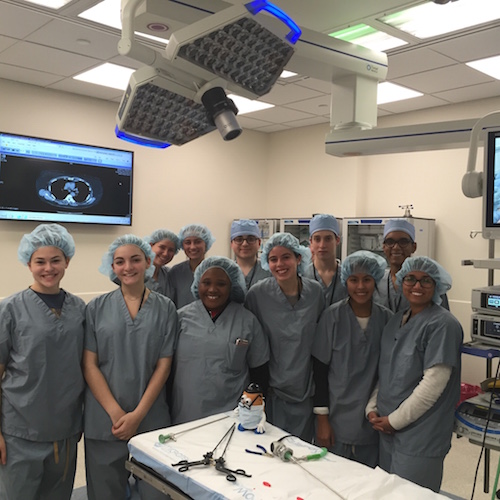Scrubs, Scarsdale Style
- Wednesday, 16 March 2016 09:16
- Last Updated: Tuesday, 29 March 2016 17:29
- Published: Wednesday, 16 March 2016 09:16
- Carly Glickenhaus
- Hits: 4910
 On a typical Wednesday night, when my senior friends were curled up watching Netflix to escape the pressure of the last few months of high school, I never expected to find myself wrapping my hands around a human colon in the pathology lab at White Plains Hospital.
On a typical Wednesday night, when my senior friends were curled up watching Netflix to escape the pressure of the last few months of high school, I never expected to find myself wrapping my hands around a human colon in the pathology lab at White Plains Hospital.
The White Plains Hospital High School Clinical Tutorial program provides twelve juniors and seniors with exposure to sixteen specialties of medicine over six months. Each week's two-hour session includes a lecture and discussion as well a hands-on experience. The twelve students, who come from Scarsdale, White Plains, Byram Hills, and Harrison, were selected by their schools' science departments to participate in this unique program. Many of the students already know they would like to pursue medicine as a career, and each shared their interests on the first day.
Endocrine Surgeon Dr. Kaare Weber, who organized the program, was impressed by the group's ambition. Some students had already decided which specialty they wanted to pursue. Surrounded by hopeful neurosurgeons and gastrological oncologists, I was one of the few who may not want to go to medical school at all. By exploring a range of subspecialties from trauma to microbiology, the program appealed to my own interests in public health and biotechnology, serving my future aspirations in the field of national security. Regardless of each student's distinct interests, the program has been an opportunity to begin considering the lifestyles that would make us happy, and the kinds of livelihoods found in science, research, and medicine. Each guest speaker has made clear that there is no one path best fit the students' visions for their future. These are an important conversations to have as a high school senior, and ones that do not take place often enough in our schools.
Flipping through a college course catalog leaves many ambitious college freshmen feeling like kids in a candy store, not knowing where to begin. The WPH program offers high school students the exposure that will be necessary to make informed decisions as they begin to navigate their career paths on a college campus, giving students experience to rely on while considering the multitude of choices before them.
After the first lecture on anesthesia, students looked at their carotid arteries on an UltraSound and passed around a series of daunting needles. To truly understand the current practices in surgery, we visited the operating room. Feeling like Meredith Grey as I slipped into scrubs, I couldn't believe I was lucky enough to see the inside of an OR, fortunately not as a patient, but as a curious student of science. Inside, students took turns testing laparoscopic surgery instruments out on a real patient on the operating table: a Mr. Potato Head stuffed with gummy worms and skittles to represent target organs.
Having read about the famous minimally invasive surgery daVinci robot during weekly nerdy indulgences in the Science Times, I never expected to have the chance to use one as a seventeen-year-old. Students had a chance to complete a simulation on the machine and compete against each other for the best score. Scoring 52%, I would have had a steep malpractice claim.
At some time or another, every high school student has felt burdened by "busy work" or has lost interest in a subject that is, to some, "useless in real life." Whether students are unmotivated and passive, or energetic and driven, programs like this promote appreciation for coursework. In Scarsdale's push for new, alternative forms of teaching, each SHS student should be offered the opportunity to learn outside the classroom. In my view, SHS should continue to seek out hands-on programs to help students of all academic interests find something that inspires and excites them.
Carly Glickenhaus is a senior at Scarsdale High School.